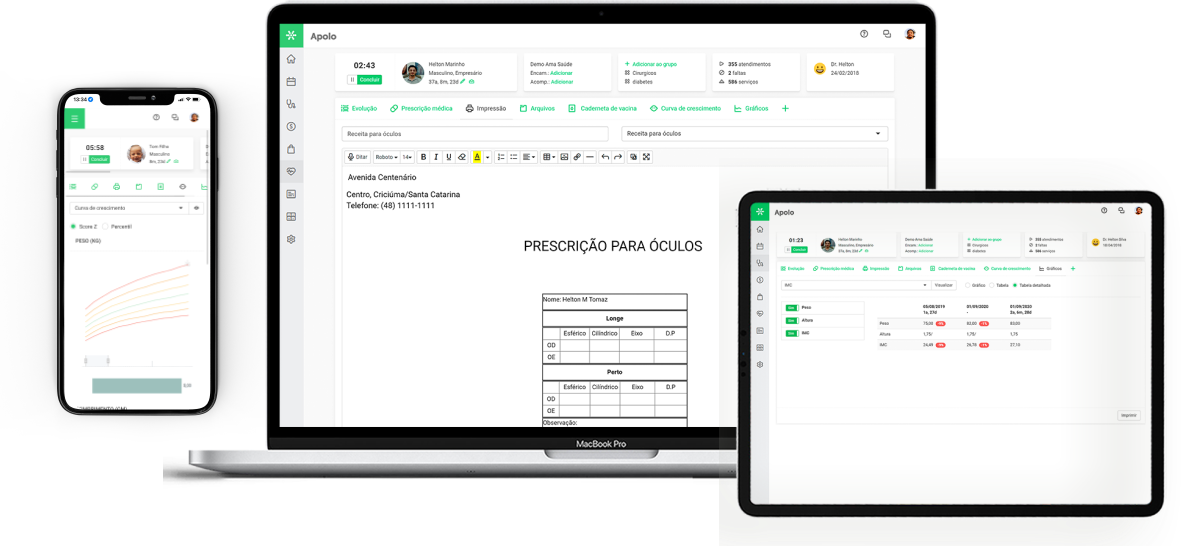
Medical referral is a fundamental procedure in the healthcare landscape, playing a crucial role in coordinating and optimizing patient care. Simply put, it is a document issued by a healthcare professional, directing the patient to a specialist or specific service.
This mechanism aims to enhance the quality of care, ensuring that each patient receives the necessary and specialized attention. The primary purpose behind medical referral is to ensure a holistic and effective approach to treatment, involving different specialties based on the complexity of the case. This practice also aims to promote seamless communication among healthcare professionals, ensuring alignment regarding diagnosis and treatment plans.
By integrating medical referral into the context of patient care, an interconnected network of specialties is created, allowing for a more efficient response to complex conditions. Ultimately, medical referral emerges as a vital link in the chain of medical care, prioritizing the health and well-being of the patient by facilitating collaboration among various healthcare professionals involved in the process.
The Importance of Diagnostic Accuracy
Diagnostic accuracy is a fundamental pillar in providing effective healthcare, and proper medical referral plays a crucial role in this process. When a healthcare professional issues a referral, they are, opening doors to more detailed and specialized information about the patient's condition.
This access to specific expertise can be especially crucial in complex or rare conditions, where the correct identification of the disease is essential for directing appropriate treatment. For instance, in cases of autoimmune diseases or intricate neurological disorders, a referral to a specialist may be the key to unraveling seemingly unrelated symptoms. By directing the patient to highly specialized professionals, medical referral creates a more direct path to accurate diagnoses and, consequently, more effective treatment strategies.
The importance of diagnostic accuracy goes beyond simply identifying the condition; it directly influences the patient's quality of life, avoiding unnecessary treatments and allowing for a more personalized and effective approach. In summary, medical referral is not just a bureaucratic procedure; it is a vital link in the pursuit of diagnostic accuracy, providing results that positively impact the patient's health journey.

Collaboration among Healthcare Professionals
Collaboration among healthcare professionals plays an essential role in providing comprehensive and effective care. Medical referral emerges as a catalyst for this collaboration, bridging different specialties. When a professional refers a patient to a specialist, they are, establishing a network of knowledge and experience.
This interdisciplinary collaboration is particularly valuable in complex cases, such as multifactorial chronic diseases, where the sum of knowledge from different specialties is greater than the individual parts. For example, in situations involving heart diseases that may have ramifications in areas like endocrinology and neurology, collaboration among cardiologists, endocrinologists, and neurologists can result in more comprehensive diagnoses and more effective treatment plans. Additionally, collaborative approaches excel in complex surgical procedures, where coordination among surgeons, anesthesiologists, and other specialists is crucial for treatment success.
Ultimately, medical referral is not just a transfer of responsibility but a collaboration strategy that places the patient at the center of care, ensuring they receive the most specialized and comprehensive attention possible. This synergy among healthcare professionals not only optimizes clinical outcomes but also enriches the patient's experience throughout their health journey.
Expediting Access to Appropriate Treatment
When a healthcare professional issues a referral promptly, they are opening doors for the patient to receive specialized care more quickly. This is especially vital in conditions where early intervention is crucial for positive outcomes.
For example, in cases of cancer, a prompt referral to an oncologist can result in early diagnosis and immediate commencement of treatment, potentially improving recovery prospects. In contrast, delays in referral can lead to significant complications. In situations such as heart diseases or orthopedic conditions, the lack of referral can prolong the wait for specialized treatment, increasing the risk of disease progression and impacting the patient's quality of life.
Therefore, efficient medical referral not only accelerates the patient's journey toward treatment but also plays a crucial role in preventing avoidable complications. By prioritizing prompt referral, healthcare professionals not only enhance treatment effectiveness but also contribute to a more positive and expedited experience for those seeking specialized care.
Advantages of Ninsaúde Software for Clinics
Operational Efficiency:
- Automation of processes streamlines patient care and management.
- Reduction of manual tasks, optimizing the team's time.
Security and Compliance:
- A robust system ensures patient data confidentiality.
- Compliance with health sector norms and regulations.
Ease of Access and Mobility:
- The cloud-based platform allows remote access to data.
- Mobile application for real-time management, offering mobility to professionals.

Customer Service:
- Specialized technical support to resolve issues quickly.
- Regular updates to keep the software aligned with market needs.
Customization and Scalability:
- Adaptation to the clinic's specific needs.
- Capability for expansion as the institution grows.
Saving Resources and Costs in Healthcare
Saving resources and costs in healthcare is a crucial aspect that medical referral significantly influences. By directing patients to appropriate specialists, this process contributes to the efficient allocation of resources, optimizing the time and efforts of healthcare professionals.
For example, a quick referral to an orthopedic specialist in cases of musculoskeletal injuries avoids duplication of unnecessary exams and consultations, resulting in more effective use of available resources. On the other hand, improper referrals can lead to unnecessary costs. If a patient is repeatedly referred without careful analysis, it not only consumes valuable resources but also generates additional costs for the healthcare system. Additionally, delays or the absence of referral can result in complications requiring more expensive interventions later on.
Thus, the effectiveness of medical referral not only improves the quality of patient care but also plays a fundamental role in the efficient management of healthcare resources, contributing to the sustainability of the system and providing long-term economic benefits.

Challenges and Obstacles in the Referral Process
While medical referral is a crucial piece in the patient care puzzle, it faces challenges and obstacles that can impact its effectiveness. Barriers such as fragmented communication among healthcare professionals, lack of access to shared medical records, and administrative bureaucracies can create significant hindrances in the referral process. The absence of an integrated approach can result in delays, loss of critical information, and even improper referrals.
To overcome these challenges, it is imperative to promote technologies that facilitate rapid and secure sharing of medical information among professionals. Additionally, initiatives to standardize referral protocols and simplify administrative procedures can streamline the process. Investment in training and continuous education for healthcare professionals also plays a vital role, in enhancing awareness of the importance of efficient referral.
By addressing these challenges head-on, we can significantly improve the referral system, making it more agile, integrated, and patient-oriented. This not only benefits the collaboration among healthcare professionals but also enhances the overall patient experience, ensuring they receive appropriate care in a timely and coordinated manner.
The Evolution of Medical Referral in the Digital Age
The evolution of medical referrals in the digital age represents a significant revolution in the healthcare landscape. The introduction of innovative technologies has brought substantial improvements, transforming how healthcare professionals collaborate and refer patients. The implementation of electronic medical record systems and information-sharing platforms has considerably simplified the referral process, allowing for faster and more secure transmission of data among professionals. This not only reduces the likelihood of critical information loss but also expedites decision-making, resulting in more accurate and efficient referrals.
The benefits of technology in medical referral include smoother communication among different specialties, reduced delays in treatment initiation, and better coordination of patient care. However, this advancement is not without challenges. The transition to digital solutions faces obstacles such as resistance to change from some healthcare professionals and concerns about data security. Moreover, the disparity in technology adoption among different healthcare institutions can create barriers to effective collaboration.
Despite the challenges, the digital evolution of medical referral represents a promising frontier in the quest for a more integrated and efficient healthcare system. By overcoming challenges with security-focused solutions and promoting widespread adoption, technology continues to play a vital role in optimizing medical referrals, benefiting both healthcare professionals and, most importantly, patients.

The Role of the Patient in the Referral Process
The role of the patient in the referral process is a key element that can significantly shape the trajectory of their care. Patient involvement goes beyond simply adhering to medical referral; it involves a conscious understanding of their health history, symptoms, and specific needs. When patients are informed and engaged, they can contribute significantly to the effectiveness of the referral by sharing detailed information with healthcare professionals. This collaboration not only expedites the diagnosis but also ensures that the referral is directed to the most relevant specialties.
Patient awareness plays a crucial role in promoting positive outcomes. Informed patients are more likely to follow healthcare professionals' guidance, attend specialized appointments, and adhere to recommended treatments. Additionally, a clear understanding of the referral process empowers patients to ask relevant questions, clarify doubts, and actively participate in decisions related to their care. This patient-centered approach not only improves the efficiency of the referral but also contributes to a more satisfying and personalized experience in the healthcare system.
In summary, the active and conscious participation of the patient in the referral process is a valuable component that enhances treatment effectiveness. As patients become active partners in their health journey, collaboration with healthcare professionals strengthens, resulting in more accurate referrals, more effective treatments, and ultimately, a more holistic approach to patient well-being.
Future Perspectives and Innovations in Medical Referral
The future perspectives of medical referral are exciting, driven by innovative trends that are radically shaping healthcare delivery. The rise of artificial intelligence (AI) is one such transformation, offering the promise of optimizing the referral process. AI can analyze vast amounts of clinical data, identify patterns, and suggest specialized referrals based on advanced algorithms. Additionally, telemedicine technologies and integrated platforms are simplifying communication among healthcare professionals, facilitating the instant sharing of crucial information.
As technology advances, Ninsaúde Clinic stands out as an innovative reference. Its software incorporates a range of features, including facilitating medical referrals. With an efficiency-centered approach, Ninsaúde utilizes modern technologies to streamline the referral process, ensuring clear and secure communication among healthcare professionals. Moreover, the platform offers AI features that can enhance accuracy in identifying referral needs, contributing to a more integrated and effective experience for professionals and patients.
As we move toward the future, it is evident that innovations in medical referral will play a vital role in improving care coordination and overall healthcare system efficiency. Ninsaúde, with its commitment to innovation, is at the forefront of these transformations, offering solutions that reflect the dynamic evolution of the healthcare field.
Did you like the tips? Keep following the blog to stay informed about more content like this. Are you a healthcare professional but still not using management software? Get to know the Ninsaúde Clinic system.
